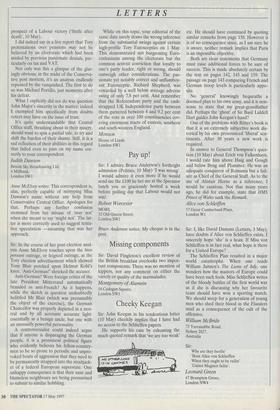Cheeky Keegan
Sir: John Keegan in his tendentious letter (10 May) cheekily implies that I have had no access to the Schlieffen papers.
He supports his case by exhuming the much quoted remark that 'we are too weak' etc. He should have continued by quoting similar remarks from page 158. However it is of no consequence since, as I am sure he is aware, neither remark implies that Paris is an impossible objective.
Both are clear statements that Germany must raise additional forces to be sure of success. This is made absolutely certain by the text on pages 142, 143 and 159. The passage on page 143 comparing French and German troop levels is particularly appo- site.
No 'general' knowingly bequeaths a doomed plan to his own army, and it is non- sense to state that my great-grandfather did. Perhaps the 'ghost' of Sir Basil Liddell Hart guides John Keegan's hand?
One of the problems with Ritter's book is that it is an extremely subjective work dis- torted by his own pronounced 'liberal' sen- timents. After 30 years a new work is required.
In answer to General Thompson's ques- tion (10 May) about Erich von Falkenhayn, I would rate him above Haig and Gough and below Byng and Plummer. He was an adequate conqueror of Romania but a fail- ure as Chief of the General Staff. As to the use of Alistair Horne as a reference, I would be cautious. Not that many years ago, he did for example, state that HMS Prince of Wales sank the Bismark.
Alice von Schleiffen
57 Great Cumberland Place, London W1


































































 Previous page
Previous page